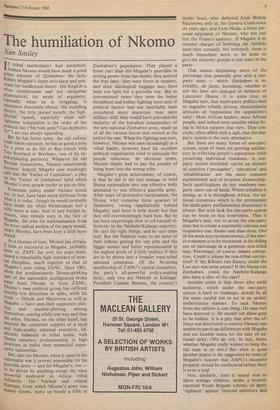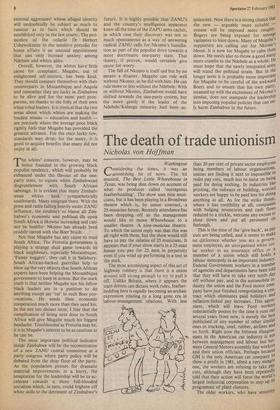The humiliation of Nkomo
Xan Smiley
If tribal mathematics had permitted, Joshua Nkomo would have made a good _Prime minister of Zimbabwe. He lacks Robert Mugabe's sharp articulacy and pen- chant for intellectual theory. His English is often cumbersome and not altogether grammatical; his mode of argument, especially when he is wriggling, is sometimes tiresomely obtuse. His waddling obesity, the little pursed mouth, the high- pitched squeak, especially when self- righteous indignation is the order of the Political day (`Me hide guns? Can elephants nYv) are not always appealing. Rut he has horse sense. An old railway trade union operator, he has as good a nose Tin a price as do Sid of Ray (check with Tiny Rowland or Brezhnev, two of his ex- Pokerplaying partners). Whatever his old Russian connections, Nkomo understands business. Indeed, Mugabe now mockingly Calls him the 'Father of Capitalism', a play on the 'Father of Zimbabwe' label which Nkomo's own people prefer to pin on him. Economic policy under Nkomo would not, in fact, have been much different from What it is today, though he would probably have made the white businessman feel a trifle more at ease. And to lure foreign in- vestors, who remain wary in the face of Mugabe, the cries for nationalisation from the more radical section of the party would, Under Nkomo, have been kept a little more muted.
As a chooser of men, Nkomo has certaih- 11, been as successful as Mugabe, probably More so. ZAPU has over the years main- tained a remarkably high standard of inter- nal discipline, much superior to that of Mugabe's now ruling ZANU. Since 1963, When the predominantly Shona-speaking Part of the nationalist intelligentsia broke away from Nkomo to form ZANU, Nkomo's own political group has suffered notably few defections or splits, while his rivals Sithole and Muzorewa as well as Mugabe — have seen their supporters plot- ting and counter-plotting among themselves, veering wildly one way and then the other. Nkomo, on the other hand, has enjoyed the consistent support of a loyal and high-quality national executive, ad- mirably balanced in tribal terms, with Shona members predominating in high positions as befits their numerical super- iority nationwide.
But, alas for Nkomo, when it came to the nationalist war it proved impossible for his guerrilla army — and for Mugabe's, too to be driven by anything except the most Powerful motivator in Africa: tribal solidarity. The Ndebele and related Kalanga, from which Nkomo's army was mainly drawn, make up barely a fifth of
Zimbabwe's population. They played a lesser part than did Mugabe's guerrillas in prising power from Ian Smith: they entered the fray later, they were fewer in number, and their ideological baggage may have been too light for a guerrilla war. But in conventional terms they were the better disciplined and bolder fighting force and, if political factors had not justifiably been considered more important than mere military skill, they would have provided the majority of the battalion commanders of the new national Zimbabwe army, made up of all the various forces that existed at the end of the war. When the fighting was over, however, Nkomo was seen increasingly as a tribal leader, however hard his excellent political organisation tried to persuade the people otherwise. In electoral terms, Nkomo simply had to pay the penalty of being born into the wrong tribe.
Mugabe's great achievement, of course, is that he did in the end manage to weld Shona nationalism into one effective body animated by one effective guerrilla army. After years of destructive factionalism, the Shona, who comprise three quarters of Zimbabwe, swung emphatically behind Mugabe, and there is little doubt but that they still overwhelmingly back him. But he has been surprisingly slow to sell himself ef- fectively to the Ndebele/Kalanga minority. He says the right things, and he says them well. But the Ndebele want to see more of their fellows getting the top jobs and the bigger money and better representation at the highest levels of ZANU politics if they are to be drawn into a broader trans-tribal national consensus. Of the 36-strong membership of ZANU's central committee, the party's all-powerful policy-making body, only two are Ndebele or Kalanga: President Canaan Banana, the country's
titular head, who defected from Bishop Muzorewa only at the Geneva Conference six years ago; and Enos Nkala, a bitter per- sonal opponent of Nkomo, who has just lost the Finance ministry. If Mugabe is to counter charges or belittling the Ndebele (and they certainly feel belittled), there is much immediate work to be done to give the minority groups a real stake in the party.
That means dispensing more of the patronage that generally goes with a one- party state — which Zimbabwe is in- evitably, de facto, becoming, whether or not the laws are changed in defiance of Lancaster House. It is quite true, as Mugabe says, that multi-party politics tend to engender tribally diverse, obstructionist attitudes of 'opposition for opposition's sake'. Most African leaders, most African people, and indeed most sensible whites liv- ing in Africa support that view. They con- clude, often albeit with a sigh, that the one- party system is the only alternative.
But there are many forms of one-party system, none of them yet proving satisfac- tory in reflecting people's aspirations while preserving individual freedoms. A one- party system inevitably carries an element of coercion (`persuasion', 'education' and `rehabilitation' are the more common' euphemisms) and of incipient dictatorship. Such qualifications do not condemn one- party states out of hand. Where tribalism is strong, as it is throughout Africa, the na- tional consensus which is the prerequisite for multi-party parliamentary democracy is absent. But with luck the one-party system can be more or less benevolent. That is Mugabe's task: not to avoid the one-party state but to create a reasonably tolerant and responsive one. Easier said than done. One of the main keys to benevolence, if the coer- cive element is to be countered, is the doling out of patronage in a generous non-tribal way. Patronage, of course, means corrup- tion. Could it please be non-tribal corrup- tion? If the Kikuyu run Kenya, could the Luo also win some prizes? If the Shona run Zimbabwe, could the Ndebele/Kalanga also have a slice of the cake?
Another point is that those who wield authority, which under the one-party system is hard to challenge, should be all the more careful not to act in an unduly authoritarian manner. To sack Nkomo from the cabinet is one thing. He may well have deserved it. He should not allow guns to be hidden. It is a pity that after the of- fence was discovered a contrite Nkomo was unable to patch up differences with Mugabe and eat humble sadza for the sake of na- tional unity. (We do not, in fact, know whether Mugabe really wished to keep the old man in or not.) But what is quite another matter is the suggestion by some of Mugabe's heavies that ZAPU's extensive, property should be confiscated before there is even a trial.
Nor, similarly, does it sound wise to allow teenage children, under a recently reported Youth Brigade scheme, to apply `vigilance' against 'internal saboteurs and external aggressors' whose alleged identity will undoubtedly be subject as much to rumour as to facts which should be established only in the law courts. The pro- motion of the volatile Dr Herbert Ushewokunze to the sensitive portolio for home affairs is an unusual appointment that can only increase anxiety among Ndebele and whites alike.
Overall, however, the whites have little cause for complaint. Mugabe, out of enlightened self-interest, has been kind. They should compare themselves with their counterparts in Mozambique and Angola and remember they are lucky in Zimbabwe to be alive and for the most part pros- perous, no thanks to the folly of their own white tribal leaders. It is ironical that the two areas about which whites are making the loudest moans — education and health are precisely where the average poor black rightly feels that Mugabe has provided the greatest advance. For the once lucky few, standards may drop; for the many, it is good to acquire benefits that many did not enjoy at all.
The whites' concern, however, may be better founded in the growing black populist tendency, which will probably be enhanced under the flavour of the one- party state, to equate white Zimbabwean disgruntlement with South African sabotage. It is evident that many Zimbab- wean whites look sympathetically southwards. Many emigrate there. With the press and radio falling heavily under ZANU influence, the tendency to blame all Zim- babwe's economic and political ills upon South Africa is likewise increasing and can: not be healthy: Nkomo has already been crudely tarred with the Boer brush.
Not that Mugabe has any cause to trust South Africa. The Pretoria government is playing a strange dual game towards its black neighbours, especially Mozambique. `Funny buggers', they call it in Salisbury. South African-backed guerrillas help to blow up the very objects that South African experts have been helping the Mozambique government to keep in action. But the stark truth is that neither Mugabe nor his fellow black leaders are in a position to do anything except say 'tut' to such Boer pro- vocations. He needs their economic cooperation much more than they need his. In the not too distant term, I fear that the complication of living next door to South Africa will give Mugabe much his biggest headache. Troublesome as Pretoria may be, it is in Mugabe's interest to be as cautious as he can be.
The most important political indicator inside Zimbabwe will be the reconstitution of a new ZANU central committee at a party congress where party policy will be debated from the shop floor of the party. As the population presses for dramatic material improvements in a hurry, the temptation for the leadership will be to ac- celerate towards a more full-blooded socialisth which, in turn, could frighten off white skills to the detriment of Zimbabwe's
future. It is highly possible that ZANU's and the country's intelligence apparatus knew all the time of the ZAPU arms caches, in which case their discovery was not so much spontaneous as a way of answering radical ZANU calls for Nkomo's humilia- tion as part of the populist drive towards a more doctrinaire one-party state. That theory, if proven, would certainly give cause for worry.
The fall of Nkomo is itself sad but by no means a disaster. Mugabe can rule well without Nkomo, as he did with him. He can rule more or less without the Ndebele. With or without Nkomo, Zimbabwe would have shifted towards the one-party system, but the more gently if the leader of the Ndebele/Kalanga minority had been ac-
quiescent. Now there is a strong chance that the new — arguably more suitable — system will be imposed more roughly' Bogeys are being exposed for teenage vigilantes to hunt down. Many of Mugabe's supporters are calling out for Nkomo's blood. It is now for Mugabe to calm them down. He needs also to throw a good many more crumbs to the Ndebele as a whole. fie must hope that the newly integrated armY will stand the political strain. But in the longer term it is probably more important for Mugabe to be careful of the awkward Boers and to ensure that his own party, steamed up with the excitement of Nkomo's demise, does not stampede the leadership into imposing populist policies that can on- ly harm Zimbabwe in the future.





































 Previous page
Previous page